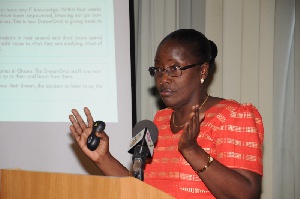The Second Lady, Mrs Matilda Amissah-Arthur has advised students to take their mentorship training serious since it has the capacity to maximise their potential.
She also advised the mentees to be honest, truthful, challenged to show commitment as well as be open to constructive criticism
Mrs Matilda Amissah-Arthur made the statement when she delivered a lecture on mentorship at the Harris Manchester College in Oxford University, UK.
The Second Lady who spoke on the theme: “Education and Mentoring: The mainstay of personal and national development,” is in the UK at the invitation of “Attaining the Peak” is an expert and student-led programme aimed at the development of different dimensions of young students’ capability and educational or professional development.
The programme is supported by a strong dynamic Advisory Board and Education Team made up of academics, professionals, entrepreneurs, parents and student volunteers.
Present at the ceremony was Mr Victor Smith Ghana’s High Commissioner and other officials from the Commission as well as Dr Juliet Emefa JAmoako, Executive Director of Oxford ATP Education.
Mrs Amissah-Arthur told the students that mentoring is basically a system of semi-structured guidance whereby persons shares their knowledge, skills and experiences to assist others to progress in their own lives and careers.
She said mentoring is to support and encourage people to manage their own learning in order to maximise their potential, develop their skills, improve their performance and become the person they want to be.
“Mentoring is a brain to pick, an ear to listen and a push in the right direction.” adding that mentee realises that he or she needs help and so identifies some body and asks for help.
Mrs Amissah Arthur noted in a mentorship exercise, the mentor is there to encourage or support the mentee or the person being guided and must be prepared to learn.
She explained the mentees must be prepared to listen and be listened to, be open and honest and be truthful.
She said the mentee must make time to meet his or her adviser, show commitment and be open to constructive criticism adding that in mentoring relationship, mentees who have the right attitude acquire values that mould them for life.
Mrs Amissah Arthur used the opportunity to cite an example of a company in Ghana, Dream Oval which started in 2007, where some young men and women who had finished university set up a software development business.
She said it was obvious they needed more than just money but also the direction even though they had the knowledge, the passion, the drive and commitment to succeed.
Mrs Amissah Arthur said the Dream Oval Company, which started from a single office room with a staff of 4, in 2007 now occupy a floor of a building and have a staff of 34. They have since 2010 run IT workshops for teachers who do not have any IT knowledge.
She said Dream Oval now works with five banks and has done work for 20 companies in Ghana. The Dream Oval staff is now role models to other young people. Other startup businesses could look up to them and learn from them.
She took the opportunity to introduction some of the founders of Dream Oval to the students at Harris Manchester College and where they did presentations and also shared their experiences with the students.
Dr Juliet Emefa Amoako, Executive Director of Oxford ATP Education stated that “Attaining the Peak” is a student-led programme, which encourages young students to aspire to achieve high academic and professional goals.
She said it is a personal development programme which gives students the opportunity to interact with Oxford University students in a variety of settings adding that it is basically a student-inspire-student, student-challenge-student and student-motivate-student programme.
She said ATP is about “lifting a young person’s hope and vision to higher sights; raising a young person’s performance to a higher standard; and building a young personality beyond its normal limitation”.
Dr Emefa Amoako said the programme encourages students to develop their thinking and understanding of local and global influences on the lives of societies and positive action for change.
She said the programme establishes productive links between the youth in the UK and other countries.
The programme, targeted at young students with ages ranging from 12 to 18 years, is meant to instill self-confidence, determination, perseverance and attaining high goals.
She said “Attaining the Peak” is also a response to some of the motivational, inspirational and academic needs of children in Oxfordshire and elsewhere.
She said programme is an initiative with charitable intentions driven by the philosophy that the provision of appropriate motivation in a conducive environment to young students irrespective of background would enable them to unlock and fulfill their diverse potentials and achieve their ultimate goals in life for the benefit of the society.
Regional News of Thursday, 14 May 2015
Source: GNA

















